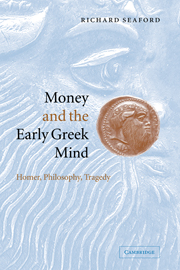Book contents
- Frontmatter
- Contents
- Preface
- List of abbreviations
- 1 Introduction
- PART ONE THE GENESIS OF COINED MONEY
- PART TWO THE MAKING OF METAPHYSICS
- 9 Did politics produce philosophy?
- 10 Anaximander and Xenophanes
- 11 The many and the one
- 12 Heraclitus and Parmenides
- 13 Pythagoreanism and Protagoras
- 14 Individualisation
- 15 Appendix: was money used in the early Near East?
- References
- Index
13 - Pythagoreanism and Protagoras
Published online by Cambridge University Press: 22 September 2009
- Frontmatter
- Contents
- Preface
- List of abbreviations
- 1 Introduction
- PART ONE THE GENESIS OF COINED MONEY
- PART TWO THE MAKING OF METAPHYSICS
- 9 Did politics produce philosophy?
- 10 Anaximander and Xenophanes
- 11 The many and the one
- 12 Heraclitus and Parmenides
- 13 Pythagoreanism and Protagoras
- 14 Individualisation
- 15 Appendix: was money used in the early Near East?
- References
- Index
Summary
EARLY PYTHAGOREANISM
About the life and doctrines of Pythagoras we are told much but know little. My concern is rather with the early period (roughly 530–400 bc) of the movement that acknowledged him as its founder. Early Pythagoreanism was unusual in combining three kinds of activity. It was a cultic society, giving rise to the idea of a ‘Pythagorean life’. It exercised political power. And it produced an orally transmitted philosophy, at the heart of which was the idea that ‘number is all’. This unique combination is I think best explained by the hypothesis that Pythagoreanism was in part a reaction to the unprecedented transformation and expansion of exchange caused by the rapid growth of coined money. A cultic society may of course be politically effective. And it may have been especially attractive and effective in circumstances in which rapid monetisation had marginalised traditional forms of political combination based on reciprocity, on kinship, and on land-based cult. Crotonians with a common political interest based on money, and yet potentially isolated from each other by money (14a), broke with tradition by resorting to an initiated society centred around a puritan form of life and devotion to mathematics expressed in the Pythagorean saying ‘of all things the wisest is number’, and in the belief that everything is number – a belief favoured, as we shall see, by the rapid pervasion of the economy by coined money.
- Type
- Chapter
- Information
- Money and the Early Greek MindHomer, Philosophy, Tragedy, pp. 266 - 291Publisher: Cambridge University PressPrint publication year: 2004



